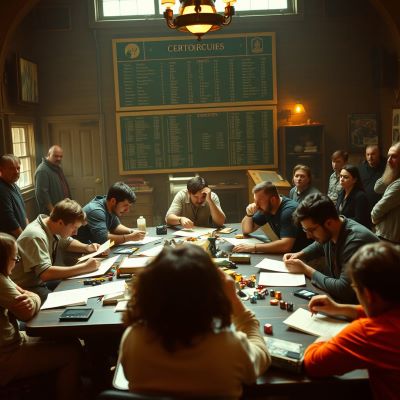Just after Christmas, some friends and I had the exhilarating experience of participating in a Dungeons & Dragons competition. But by their nature roleplaying games aren’t a competition, I hear you say. Normally, I would agree. However, we thought we’d give it a go. You don’t get many opportunities to pit your D&D skill against other parties. After reading this you may see some merit in competitive D&D.
The tournament saw multiple groups navigating through the legendary Gary Gygax adventure: The Lost Caverns of Tsojconth. Although we missed the official tournament sign-up, our friend Rich, who was DMing at the event, graciously agreed to run a separate session for us. The event was organized by the local group DnD Fremantle, who have done a fantastic job fostering a vibrant D&D community in our local area.
The Challenge
The competition was structured in two intense 2-hour blocks, requiring rapid decision-making and strategic thinking. Initially, we struggled with the limited time to familiarize ourselves with our character sheets, spells, and abilities—only 15 minutes! It was a challenging start, but we quickly adapted to the fast-paced environment.
Rich, our DM, used a scoring system to evaluate our progress, awarding points for achieving specific goals in each encounter. The objective was to traverse as much of the adventure as possible within the 4-hour limit. In the real tournament 5 groups all ran through the adventure at the same time and their scores totaled at the end to determine the winning team.
The Party
From memory, we had 6 pre-generated characters to choose from: monk, wizard, warlock, fighter, cleric and rogue. As mentioned above, we had 15 mins to choose our characters and understand how they worked. Our final party comprised four level 9 adventurers:
- Ethelrede, a stalwart human fighter
- Cathartic, a devoted human cleric
- Weslocke, a cunning Tiefling warlock
- Dunil, a resourceful halfling rogue
There should have been five, but unfortunately one of our players was ill on the day.
Key Encounters
The adventure was very “old-school”, with seemingly random creatures dotted around an underground cave system. It did mean that you never quite knew what was around the corner. Some of our memorable encounters included:
- The Mud Golem: Early in the adventure, we faced a formidable mud golem guarding a magical sword. This creature could only be damaged by magical means, which significantly limited our options. It was a close call, especially for my character, Dunil, who nearly perished in the encounter (only 2hp left).
- Gem-Hauling Statue Faces: We successfully navigated a trap-laden room filled with gem-inlaid statues, managing to extract the gems without losing any limbs.
- Friendly Pechs: In a refreshing twist, we encountered Pechs—goblin-like creatures who turned out to be friendly allies. This encounter provided a brief respite from the relentless dungeon hazards.
- Chuuls’ Deadly Ambush: Crossing a river proved fatal as we were ambushed by paralyzing crab-like creatures, the Chuuls. This encounter ended in a total party kill (TPK), forcing us to restart. It was a humbling experience but one that bonded our team.
- Fierce Formian Battle: Our session concluded with a fierce battle against Formians, ugly ogre like creatures with sinister eyes. This encounter tested our combat strategies and teamwork to the limit.

Lessons Learned
- Pre-Game Planning: It’s crucial to allocate more time for character selection and understanding character abilities. Knowing who will play which type of character and having a strategy for dungeon interaction can save valuable time.
- Team Urgency: The competition format instilled a heightened sense of urgency. Quick decision-making and effective communication became our focus, improving our overall gameplay.
- Adaptation: Adapting to the competition’s fast pace was challenging but ultimately rewarding. By the second half, we found our rhythm, coordinating efficiently as we navigated the labyrinthine caverns.
We ended the adventure with a score of 8 points, which included a -5 penalty for the TPK. While this might seem modest compared to the winning team’s 18 points, we considered it a solid performance for our first competitive run. More importantly, the experience was incredibly fun, thanks to Rich’s masterful DMing.
More Competitive D&D?
This competition has whetted our appetite for more. We’re already planning to enter the next tournament with lessons learned and a renewed sense of strategy. If you’re considering a competitive D&D experience, we highly recommend teaming up with friends and diving into the challenge. It’s an unforgettable way to test your skills and deepen your love for the game.
See you in the next adventure!



